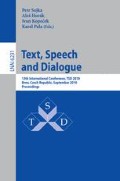Abstract
In this paper, we study the use of heterogeneous data for training of acoustic models. In initial experiments, a significant drop of accuracy has been observed on in-domain test set if the data was added without any regularization. A solution is proposed by getting control over the training data by optimization of the weights of different data-sets. The final models shows good performance on all various tests linked to various speaking styles. Furthermore, we used this approach to increase the performance over just the main test set. We obtained 0.3% absolute improvement on basic system and 0.4% on HLDA system although the size of the heterogeneous data set was quite small.
Access this chapter
Tax calculation will be finalised at checkout
Purchases are for personal use only
Preview
Unable to display preview. Download preview PDF.
References
Dempster, A.P., Laird, N.M., Rubin, D.B.: Maximum Likelihood from Incomplete Data via the EM Algorithm. Journal of the Royal Statistical Society. Series B (Methodological) 39(1), 1–38 (1977)
Gales, M.: Maximum Likelihood Linear Transformations for HMM-Based Speech Recognition (1997)
Kumar, N.: Investigation of Silicon-Auditory Models and Generalization of Linear Discriminant Analysis for Improved Speech Recognition. Ph.D. thesis, John Hopkins University, Baltimore (1997)
Iyer, R., Ostendorf, M., Gish, H.: Using Out-of-Domain Data to Improve In-Domain Language Models. IEEE Signal Processing Letters 4(8), 221–223 (1997)
Tsakalidis, S., Byrne, W.: Acoustic Training from Heterogeneous Data Sources: Experiments in Mandarin Conversational Telephone Speech Transcription. In: Proceedings of IEEE International Conference on Acoustics, Speech, and Signal Processing (ICASSP 2005), March 18-23, vol. 1, pp. 461–464 (2005)
Author information
Authors and Affiliations
Editor information
Editors and Affiliations
Rights and permissions
Copyright information
© 2010 Springer-Verlag Berlin Heidelberg
About this paper
Cite this paper
Karafiát, M., Szöke, I., Černocký, J. (2010). Using Gradient Descent Optimization for Acoustics Training from Heterogeneous Data. In: Sojka, P., Horák, A., Kopeček, I., Pala, K. (eds) Text, Speech and Dialogue. TSD 2010. Lecture Notes in Computer Science(), vol 6231. Springer, Berlin, Heidelberg. https://doi.org/10.1007/978-3-642-15760-8_41
Download citation
DOI: https://doi.org/10.1007/978-3-642-15760-8_41
Publisher Name: Springer, Berlin, Heidelberg
Print ISBN: 978-3-642-15759-2
Online ISBN: 978-3-642-15760-8
eBook Packages: Computer ScienceComputer Science (R0)

